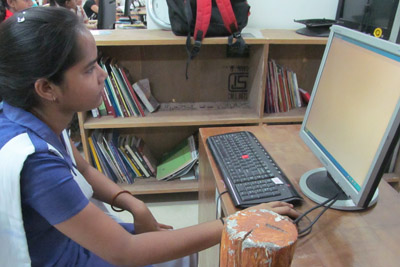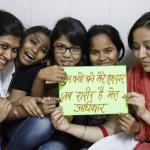My experience in government schools when collecting data
October and November 2013 saw us reaching out to government schools for the quantitative data collection for FAT's school contact programme. FAT's school contact program is a two pronged project, consisting of a research component and an intervention component. The research component is aimed at finding out reasons as to why do girls self eliminate themselves from STEM subjects, and on the basis of those findings, proposed interventions would be put in place.
The first school that figured on our list was the most organized school in terms of the manner in which they helped us in the entire process of data collection. We had already been assigned a teacher who guided us thoroughly. The teachers here were a bit disgruntled. One of the teachers said that her chances of promotion were slim because of her degree constraints. She said that the incentives were too little for them to be able to perform fully.
The second school falls in the interiors. Every time I visited this school, my interaction with the Principal gave me a glimpse into his understanding of morality. He said that the prevalent modern culture is directed towards hedonism, "girls and boys are more interested in making girlfriends and boyfriends than studying". Corporal punishment seemed a norm here, especially perpetrated by older male teachers. Here, the students were having tremendous difficulty in even understanding basic Hindi. I had to go through questions one by one to make them understand the questions from the questionnaire.I had to write on the board to make them understand those questions. Class VIth students found it very difficult. The female teachers here were very cooperative. One of the older male teachers said that "the government policies are geared towards making them even weaker in studies, their performance is never evaluated at school level wherein they are given grades and allowed to move up the ladder. However, when suddenly they are faced with exams, they simply can't cope". The Principal also said that when "they can't even read Hindi, how do you expect them to do well in Science, we will have to teach them Hindi first".
In the next week, we embarked on data collection from two other government schools. The Principal of this school is an enthusiastic woman. She is a new appointee, and is trying to bring about organizational changes in school, however the staff is steeped in old ways. In the morning, while waiting for the Principal to arrive, we saw a disabled student being curtly told off by the gatekeeper who said, "Did you expect special treatment?" We started at 8 AM, however, very few students were present owing to Dusshera holidays thereby resulting in a very feeble response. This school offers Science stream. Unlike, the previous two schools, here the students didn't have any trouble in understanding Hindi. Incidentally, two of our bright students at the tech center are studing in this school. We got only 111 responses, so we decided that we will have to come another day to get responses from all the students.
After witnessing the lukewarm response in the previous schools, I decided to speak with the Vice Principal of the next school in our list to inquire about the number students present at the school before we landed there with our bundles of questionnaires. She said that majority of the students were present. To this, one of the volunteers accompanying us for the data collection quipped, "It's an all girls school, therefore so many of them are present". I wondered if this is just an assumtion or are girls really more sincere than boys about attendence in school.
One of the most disturbing things at this school was the proximity of washrooms close to the classrooms. The classes adjoining the washrooms were perpetually filled in with the unwarranted stench of urine. The teachers were not to be found in the classroom, three of us did the data collection on our own.
All these experiences and encounters at school gave us an understanding about the way government schools function in our country. Sadly enough, it's a long road ahead before we can claim ourselves to be a nation of innovators, inventors and scientist unless the basic amenities are provided to the students from the disadvantaged background.
------------------
Shambhavi is a dynamic and young Program Associate at FAT and works in the School Contact Program.




